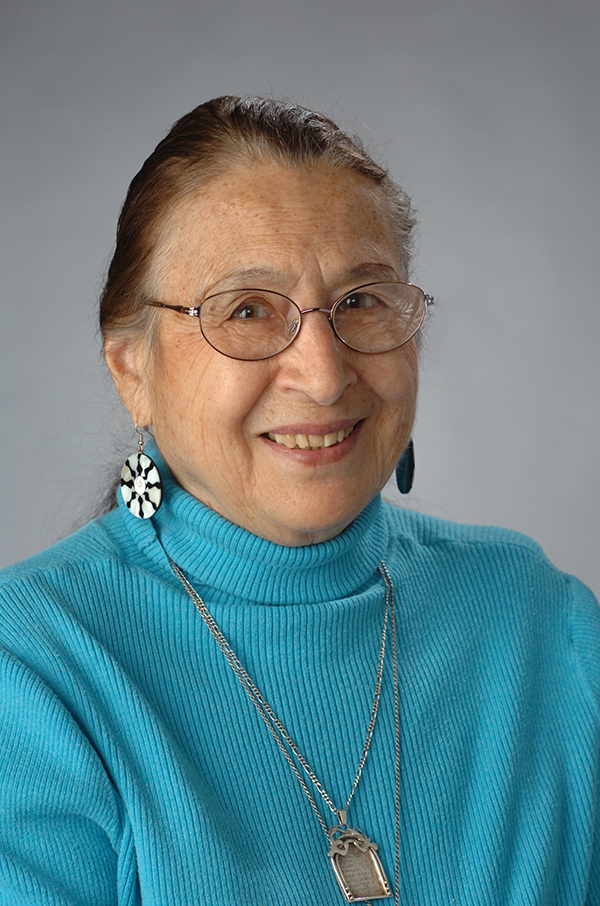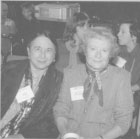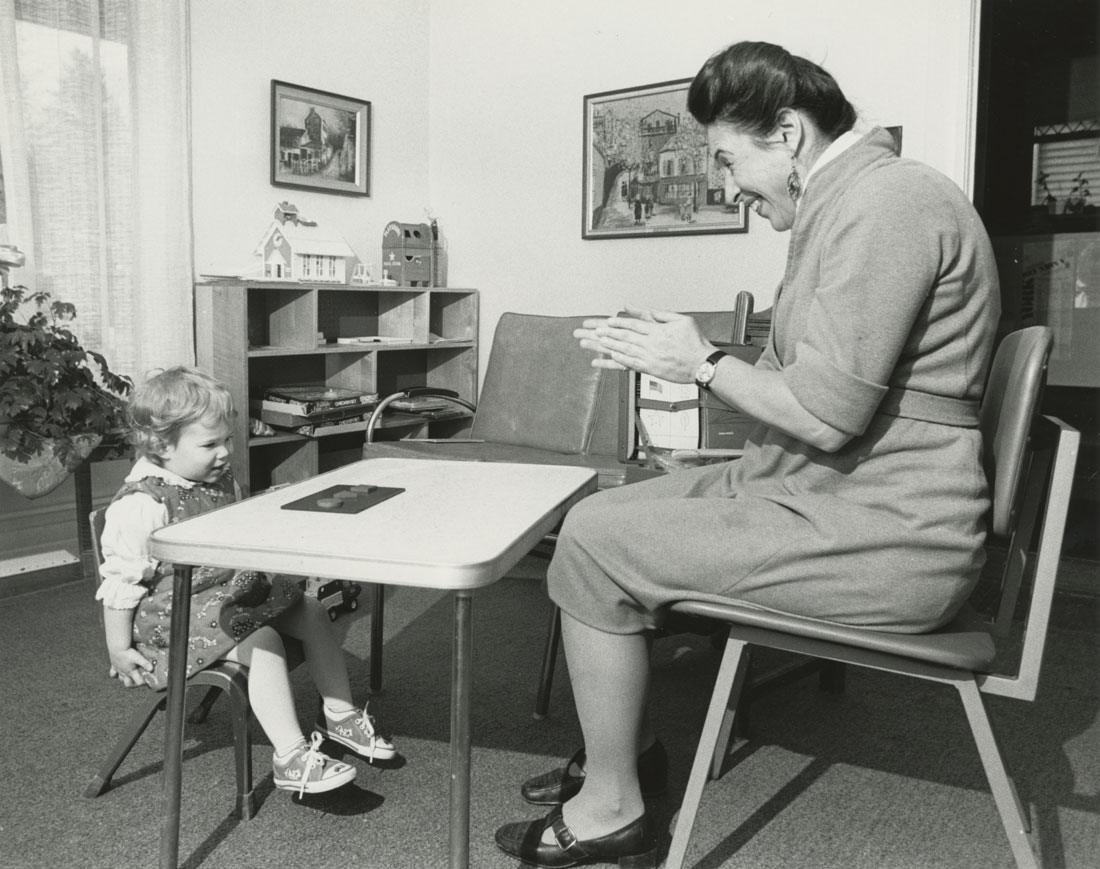
Alice Sterling Honig, Professor Emerita of child and family studies (now the Department of Human Development and Family Science) in the Falk College, died March 7, 2023. She was 93.
Honig earned a B.A. from Barnard College and a M.A. from Columbia University, both in experimental psychology, and a Ph.D. in developmental psychology from Syracuse University. Through her early training in the psychological sciences and academic career at Syracuse University that spanned over five decades, Honig was a champion for the rights, welfare, and the optimal development of young children.
“I will miss her smiles, her hugs, her jokes, her crystal-clear insights, and her clarity of thought,” says Professor of Practice Thom deLara. “Alice was a force to be reckoned with, but she handled it with humility and grace. I will miss her warm greetings and wonderful stories. The college has lost a giant in her field.”
Aligned with President Lyndon Johnson’s great war on poverty in the 1960s, Honig and her colleagues implemented one of the longest federally funded intervention programs aimed to ward off the pernicious effects of poverty on the social, emotional, cognitive, and physical development of young children in the Syracuse area. This program became a model for national initiatives to lift children out of poverty.
Honig was the graduate assistant of Syracuse University professor Bettye Caldwell who, with Julius Richmond of Upstate Medical University, formed the Children’s Center in Syracuse in 1967–the first early intervention program in the country and the foundation of Head Start. This also built the legacy of excellence in early childhood care at Syracuse University.
Working with Upstate Medical University pediatrician Frank Oski in the late 1970s, she assessed iron deficient infants and toddlers in a ground breaking trial showing cognitive and behavioral improvements after iron therapy. Following her interest in cross-cultural child-raising, she took part in Caldwell’s team of early childhood specialists invited to China to visit child care centers in 1975. She returned to Beijing at age 83 to teach about child development and present an award in her name.
Longtime colleagues of Honig remember her as a kind and compassionate person who expressed a deep sense of gratitude and humility. “Alice was a strong, brilliant woman who cared. Her work and her life were a blessing to children and families everywhere. She threw everyone she met a kiss,” recalls Teaching Professor Emeritus Joseph Fanelli.
Associate Professor Emerita Ellen deLara says, “Alice was a wonder, intellectually and personally. In her natural exuberance for life, she provided support for students and encouragement for junior scholars. In the darkest times, she still reached out with something quirky, funny, or uplifting. We have lost a treasure.”

Equally impressive were her steadfast attempts to catalog and promote early education practices that are child-centered and embrace neo constructivist perspectives that enable children to be shaped and shape their own development. Her scholarly publications are used in child development and early childhood education programs to train students and other professionals in university and community settings across the world. Honig also served as an editor and editorial consultant on many professional journals and for book publishers, including her service as a editor of the research in review section of “Young Children” and associate editor of “Early Child Development and Care,” both prominent journals in her field.
Honig was a prolific scholar who assumed central roles in national and international organizations such as the National Association for the Education of Young Children (NAEYC) and Society for Research on Child Development (SRCD). Through keynote addresses and membership in governing bodies in these and other organizations, she conveyed that attending to the needs of children and families is at the heart of social justice. She was a sought-after speaker at conferences due to her breadth of knowledge and her ability to convey both theoretical and practical knowledge at a level that was comprehensible and engaging to both lay and professional audiences. Her international reputation was one of several factors contributing to the depth of participation by international students in the Department of Human Development and Family Science.
She actively worked with graduate and undergraduate students as an instructor and as a mentor for their professional and scholarly development. She developed many of Falk College’s core undergraduate and graduate courses–a reflection of her broad areas of interest and expertise in the field. Honig was always willing to share her knowledge and experiences with students and fellow faculty members to assist them in planning and implementing their courses. She served as a valued committee member on uncounted thesis, comprehensive examination, and dissertation committees in the Department of Human Development and Family Science and across the University. In the Department, her important contributions to the scholarly development of graduate students are honored with the Alice Sterling Honig Graduate Research Award given annually to the graduate student whose scholarly contributions are particularly meritorious.

In addition to her scholarly and professional contributions, Honig was engaged in many community organizations and activities. She was an early researcher and supporter of Head Start programs and was actively involved in the boards of many daycare centers in the Syracuse community, especially those serving underprivileged populations and individuals whose familial and personal histories were affected by race and class prejudice.
Honig was also a talented musician who prided herself on her broad knowledge of lullabies and musical nursery rhymes from across the world–a knowledge she delighted in sharing with students, colleagues, and audiences. For many years, she was an active member of the Syracuse University Oratorio Society and was a key member of a local folk singing ensemble. She also was active in her religious community, sharing her insight and experiences at her Temples and with other religious organizations. Her intellectual curiosity went beyond the field of child development, extending into art, archaeology, anthropology, biology, and medicine. She was an avid gardener, traveler, and humanitarian. She was innately curious and encouraged curiosity and learning in all those she encountered.
Honig was active in the life of Falk College and its students long past the time of her retirement. She nurtured the growth of students, early childhood educators, and parents from all levels of society across the world. She was a valuable scholar, colleague, and friend. Her contribution to the field of child development will live on into the distant future.
The Falk College family would like to extend it deepest sympathy to Dr. Alice Sterling Honig’s family and the sincerest appreciation to the authors of this article for sharing their memories of Honig and insights into her remarkable life and career.
By Pearl S. Falk Endowed Professor Jaipaul Roopnarine, Associate Professor Emeritus D. Bruce Carter, and Professor Ambika Krishnakumar
